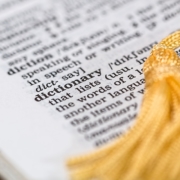Peculiar words that made it into Duden’s 27th edition, the major reference dictionary of German language
The renowned dictionary for German language Duden, published for the first time in 1880 by Konrand Duden, recently printed its 27th edition.
This new publication covers and analyses extensively all the aspects of the German lexicon, including but not only, the grammar, spelling and synonyms. The peculiarity of the new publication stands in its introduction of 5000 new words that previously didn’t exist, building up a comprehensive dictionary of 1264 pages which reflect the influences that are shaping German language today.
The novelty: denglish and anglicisms
Gran part of the new terms included in the revised version of the dictionary emerge out of the social and political developments of this new century, defined in gran part by the entrance of social media and its impact on global communication. Peculiar is the blending of English and German, common to any english student in a German classroom, giving rise to a new language, commonly referred to as Denglish. Amongst the Denglish words that have made it in the Duden dictionary there are facebooken (to be on facebook), liken (to ‘put a like’) and emoji. Postfaktish is another interesting term which stems out of the contemporary fake news debate and the need to certify the validity and truth of a news. Other terms have instead remained in their english version, such as veggie, tablet, selfie, darknet, hashtag and Brexit.
The debate
The influence of English on the German language is a growing phenomenon, reflecting the developments of the German societal fabric. It is in fact in English that new words and terms have been coined to express global developments. Furthermore, regardless of the Brexit, it remains a commonly spoken language in Europe. Verein Deutsche Sprache, an organizations whose aim is to defend the purity of German language, had already expressed itself against the previous revised version of the Duden, which already in 2013 included different English-derived, or Denglish, words. The influence of English in German isn’t however a new phenomenon: already in 1880 Duden included 27 000 spoiled words and terms. Today, amid anglicisms and neologisms, the count has reached 145 000.
German neologisms
Amongst the new terms that have found their way in the dictionary are also German neologisms previously sought to as informal expressions, which now have been officially recognized and validated. To cite a few, Cyberkreig (virtual /online war) and Hasskriminalität (hate crime) are now new German words. Kopfkino (to daydream, or to be exact, to have an inner/mental cinema), Kopftuchstreit (the debate on the headscarf), Nachtshopping (to shop late at night) and Wildpinkler (one who likes to urinate in an outdoor setting) are other interesting terms. Also, Schmähgedicht (blasphemous or insulting poem), is a new term, coined by the comedian Jan Böhmermann in his recent ode to Turkey’s president Erdogan.
Furthermore, certain terms have received a grammatical revision. Amongst these, three English words influenced by German have been reintroduced in the dictionary in their original format. Majonäse returned to be Mayonnaise, as so has Ketschup, now Ketchup, and Anschovis, now Anchovies. With regards to the spelling, the most relevant changes consist of the introduction of dashes in words like Co-Trainer and Ex-Kanzler, and the introduction of the capital version of ß.
Cover photo © CC0 Creative Commons
Want to perfect your German in a vibrant environment? Then take a look at the courses that Berlino Schule organizes by clicking here!

